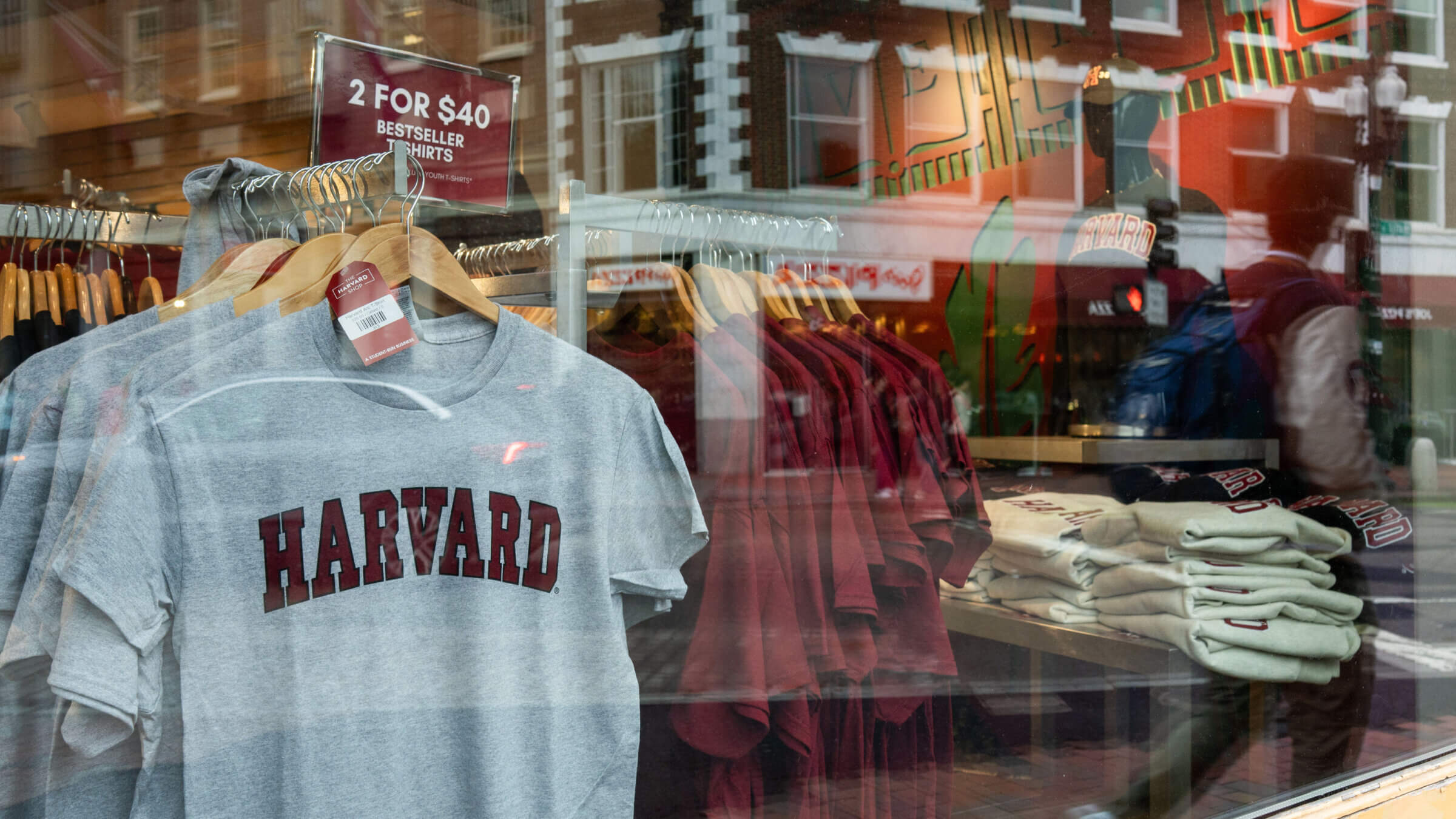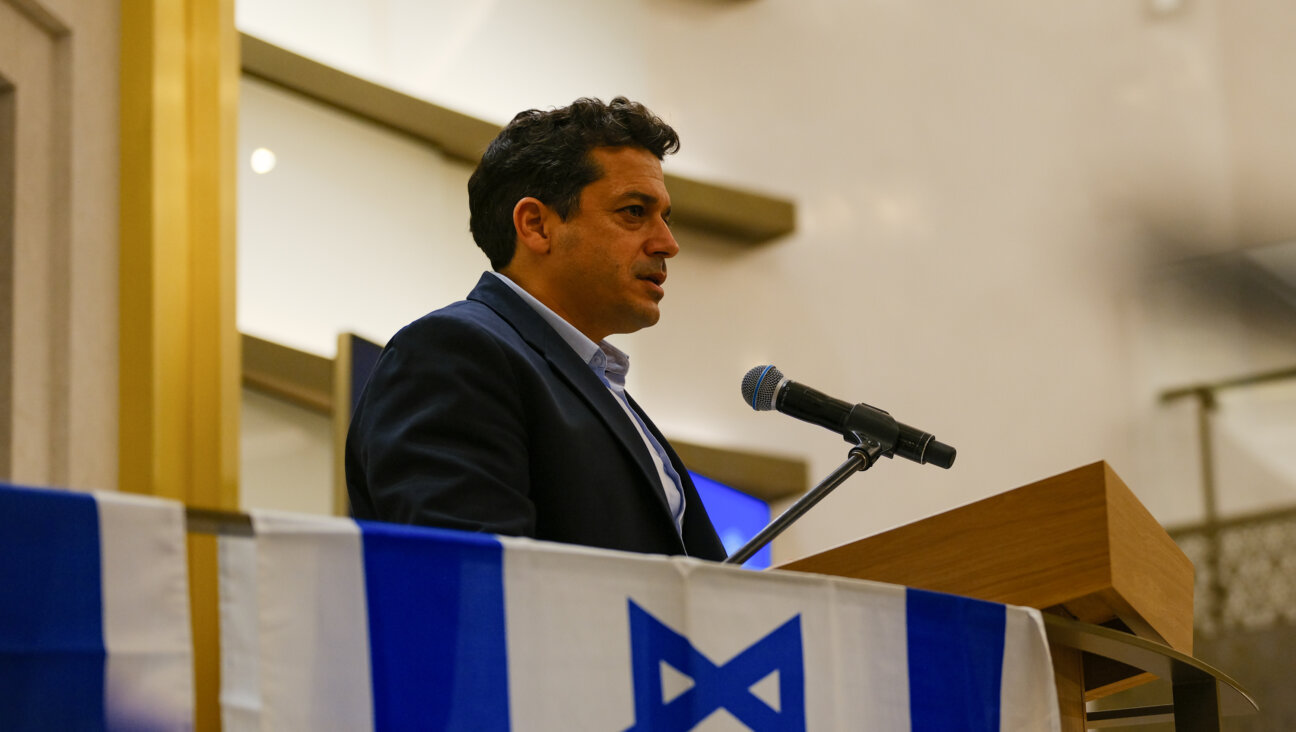What do we really mean by ‘campus antisemitism’? Harvard explains
‘Is she a fanatical, racist Zionist or just a Jew?’ one student asked

Harvard University merchandise displayed at a store in Cambridge, Massachusetts on May 5. Photo by Getty Images
Antisemitism Decoded is the Forward’s biweekly newsletter that helps you separate the signal from the noise and understand current debates over Jewish safety. Sign-up here.
As more Jewish leaders have opposed the Trump administration’s crackdown on colleges and universities in recent months, virtually all of them hasten to add that the underlying problem of campus antisemitism is a serious one.
Amy Spitalnick, who has become a chief critic of President Donald Trump’s antisemitism strategy from atop the Jewish Council for Public Affairs, said during a recent CNN appearance, for example, that “of course antisemitism exists on a number of college campuses.”
Yet it has often been unclear what, exactly, pervasive “campus antisemitism” is actually describing. Some consider the protests against Israel to be inherently antisemitic, but that is hotly contested. Others point to instances of explicitly antisemitic taunts or assaults, for example, but those are rare.
Harvard may have finally provided an answer.
***
It’s been clear since shortly after the Israel-Hamas war began that hostility toward Israel has reached a fever pitch in progressive spaces that many Jews called home, just as compromise and civil discourse was falling out of favor.
But those sounding the alarm over campus antisemitism — to Congress, on social media, in official statements — have been determined to go beyond that explanation. Maybe because it seemed to frame the problem as a political disagreement, or even allowed blame to be assigned to Israel. Or because it generated less political currency. Jews feeling uncomfortable is different from Jews being unsafe.
Whatever the reason, descriptions of campus antisemitism that go beyond social discomfort penetrated the national conversation. Former President Joe Biden spoke last spring about “Jewish students blocked, harassed, attacked while walking to class,” while Trump has accused colleges of promoting “antisemitic propaganda.”
A new report from Harvard’s antisemitism task force took a different — and more courageous — tact: Social alienation is the central problem, and it’s a big one. “Perhaps the best way to describe the existence of many Jewish and Israeli students at Harvard in the 2023-24 academic year is that their presence had become triggering, or the subject of political controversy,” the authors wrote.
The report avoided the dramatic yet often confusing, inconsistent, and isolated accounts in a similar report from Columbia University that described Jewish students “chased out of dorms, spat on, and pinned against walls.”
The Harvard task force instead chose to focus on the more subtle ways that the ability for Jewish students to fully participate in campus life was constrained by venom toward Israel.
***
One Jewish graduate student told the task force about a gathering where a few of his friends said that they felt unsafe around an Israeli student on campus because of his nationality. The graduate student said he “defended him as a person” without discussing the Israeli-Palestinian conflict, but subsequently found himself shunned by more than a dozen of his closest friends.
“I learned that one of the people in the friend group had labeled me a Zionist,” he said. “As such, when that group spends time together, I will not be invited anymore because some of the people do not want to associate with me.”
Skeptics might discount this as an instance of antisemitism because the friends shunned this student over a disagreement related to Israel. But regardless of their actual political stance on Israel, Jewish students are far more likely than other students to know Israelis and have a textured view of the country. Expressing that, even in mild ways, marked some Jewish students with a scarlet letter, a theme that came up throughout the report.
“Is she a fanatical, racist Zionist or just a Jew?” a non-Jewish Harvard student asked a friend about a Jewish peer, according to another anecdote included in the 311-page document.
“I don’t want to go to Hillel, I fucking hate Zionists,” one student told his Jewish roommate when they were considering whether to attend an event there.
***
The confounding aspect of this reality is that it’s almost impossible to discipline students for this behavior. “What can Harvard Law School do about the dirty looks?” asked one Jewish law student.
While the report’s authors call for tightening some disciplinary standards, their overall recommendations, which focus on creating a “culture of pluralism,” are thoughtful and nuanced. They treat the rise of anti-Zionism on campus not primarily as the reincarnation of ancient hatred toward Jews but as a political and social phenomenon tied to both conditions on the ground in the Middle East and broader trends, like a growing emphasis on group identity and the oversimplification of complex topics.
This is a brave stance because it acknowledges that the situation is less ominous than some have argued. “Harvard is home to a dazzlingly talented and thriving Jewish community,” the authors write.
Arrests, suspensions and funding freezes might work to address the real but rare instances of physical assaults or the most extreme expressions of antisemitism. But a heavy-handed approach is unlikely to win hearts and minds, especially at a time when support for Israel is tanking among basically every demographic group in the U.S., and Israeli officials seem determined to confirm the worst accusations they’ve faced from campus protesters.
By acknowledging that the most pervasive expression of campus antisemitism at Harvard leaves Jewish students feeling socially ostracized in relationships and spaces they once belonged, the task force has taken the first step toward actually addressing it.
GO DEEPER
- At Harvard, reports on antisemitism and anti-Palestinian bias reflect campus conflict over Israel (Forward)
- Harvard’s President Is Fighting Trump. He Also Agrees With Him. (New York Times)
- Final Report from the Presidential Task Force on Combating Antisemitism and Anti-Israeli Bias (Harvard)
















